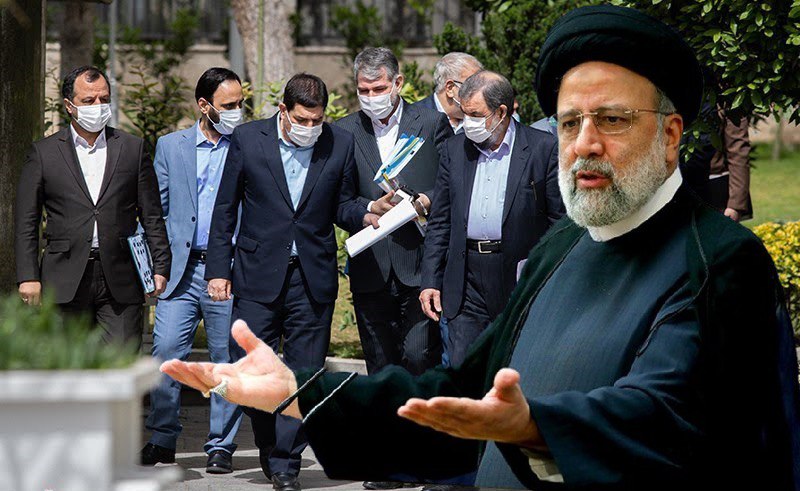In Search of Patterns of Change in Raisi’s Government
Raisi Lacks the Courage to Dismiss His Ministers
In search of patterns of change in Raisi’s government, according to Iran Gate, the impeachment plan of Seyed Reza Fatemi Amin, the Minister of Industry, Mine and Trade in Raisi’s government, has once again heated up the discussion of changes in the thirteenth cabinet in the eleventh parliament. This is while none of the impeachment plans for Raisi’s ministers in the eleventh parliament have reached a conclusion, either not receiving votes or failing to secure the necessary votes in the final stage.
The announcement of the impeachment of the Minister of Industry, Mine and Trade quickly spread in the media, when suddenly another news overshadowed the previous headline. According to reports in media close to the government, some representatives who had signed the impeachment of Fatemi Amin retracted their signatures and withdrew their support.
Recently, one of the representatives announced the formation of an urgent meeting in the parliament regarding the impeachment of Fatemi Amin. However, such a meeting does not align with any of the protocols for ministerial impeachment. Now it seems this meeting is defined as an effort to prevent the impeachment of the Minister of Industry, Mine and Trade in the parliament from reaching a conclusion.
From Abdolmaleki to Fatemi Amin
Hojatollah Abdolmaleki was the first member of Raisi’s cabinet to be led out of the thirteenth government’s train after seven months. However, Abdolmaleki, as the saying goes, went out through the door but returned through the window, seizing the highly sensitive position of head of the Free Zones. The point is that Hojatollah Abdolmaleki, regardless of his very weak performance, was the first minister to fall victim to Raisi’s pattern of removing government members.
After Abdolmaleki, Masoud Mirkazemi, Rostam Ghasemi, Mohammad Hadi Zahedi Vafa, and Ali Salehabadi also lost their positions in Ebrahim Raisi’s government under the pattern of resignation instead of impeachment and dismissal. Each submitted their resignation letters to the head of the thirteenth government with different excuses. However, the subsequent reactions of these individuals indicate that their resignations were forced from their occupied positions. From Abdolmaleki to Masoud Mirkazemi, all took stances after their resignations that indicated Raisi’s severe dissatisfaction with their performance.
However, it seems that Ebrahim Raisi does not possess the necessary influence and decisiveness to lead the cabinet as he should. Dismissing and appointing managers is a lever that can help top executives face managerial crises, but the head of the thirteenth government has decided to ignore this tool and force managers to resign while maintaining appearances.
The Parliament’s Stance is Clear
Considering the issues raised, the question arises as to why the impeachment of ministers and bringing cabinet members to the parliament floor is being pursued if the government does not intend to make dismissals and appointments in this regard. Why does the parliament strive for ministerial impeachments?
The answer is very simple and clear: the reason for this behavior of the eleventh parliament’s representatives is to gain a share from Ebrahim Raisi’s revolutionary government. This parliament, which has had the most involvement with the government among all the Islamic Consultative Assembly’s terms, is now trying to pressure the government through the issue of impeachment to get its share from the president.
Of course, it should not be forgotten that some of these representatives registered for the thirteenth presidential election and immediately supported Ebrahim Raisi. Examples like Alireza Zakani, Ehsan Khandoozi, Amirhossein Ghazizadeh Hashemi, and Seyed Javad Sadatinejad are among those who have followed this pattern to get their share from the government.
Now, the remaining representatives who feel left out of the young and revolutionary government are trying to claim their share from the head of the thirteenth government through pressure levers such as ministerial impeachments, investigative plans, fiery speeches, each according to their influence.
Raisi is Courteous with His Ministers
As mentioned, Ebrahim Raisi has decided not to dismiss any cabinet members, even if they have an extremely weak performance. Some senior government officials have also said that this type of resignation is more to preserve the dignity of ministers whose performance is not satisfactory.
However, this type of behavior from Raisi suggests that he probably has a courteous relationship with government members. The reason for this could be Raisi’s indebtedness to managers who supported him unconditionally before the elections, or perhaps Ebrahim Raisi lacks the courage and competence to lead the executive branch.
Although evidence shows that the head of the thirteenth revolutionary government is caught in a narrow and dark dilemma: on one hand, he lacks the necessary decisiveness and authority to dismiss managers, and on the other, he feels indebted to them and fears that yesterday’s defenders may become tomorrow’s critics. He tries, as he puts it, to bid farewell to his ministers with forced resignations, but immediately after one or two months, he compensates those farewelled by sending them to seize other positions.
Rostam Ghasemi Left, Another Commander is Coming
English
View this article in English

